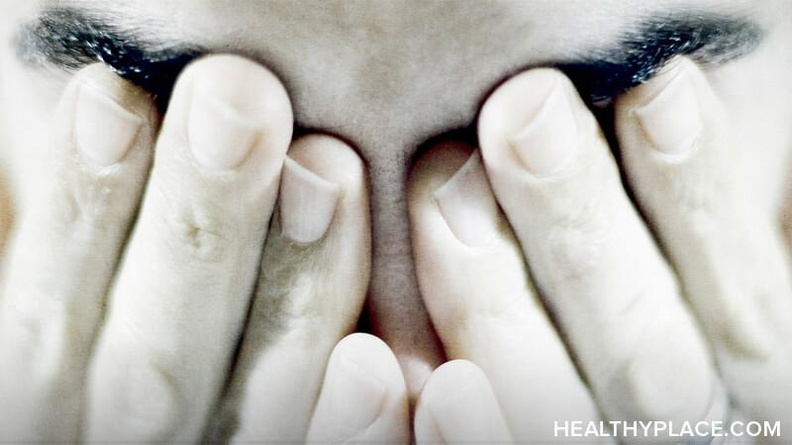PTSD Recovery: Avoiding Avoidance

Avoidance is common in posttraumatic stress disorder (PTSD) sufferers when triggered. Wanting to hide or run away from certain situations or avoiding negative emotions that come up is almost automatic for me when I'm dealing with PTSD symptoms. PTSD Symptom avoidance, especially emotional, may work to alleviate feelings of anxiety and panic for the short-term, but in the long run, avoidance can worsen PTSD symptoms and make life more difficult.
PTSD Recovery and Avoidance -- My Experience
I was once home alone in the middle of the afternoon when someone knocked on the gate to my front patio. I had already been feeling anxious and triggered for some reason and when I heard the knocking I was immediately panicked (PTSD Recovery: How To Cope With Triggers). Instead of looking out a window to see who was trying to reach me, it seemed safer and even more rational to me to grab  my dogs and go hide in the bathroom until whoever it was went away. Clearly, that wasn't exactly normal behavior, but my fight or flight kicked in, and the only place to flee to was the bathroom farthest away from the front door. I never did find out who was trying to contact me that day. This is an example of PTSD and physical avoidance.
my dogs and go hide in the bathroom until whoever it was went away. Clearly, that wasn't exactly normal behavior, but my fight or flight kicked in, and the only place to flee to was the bathroom farthest away from the front door. I never did find out who was trying to contact me that day. This is an example of PTSD and physical avoidance.
Many of us also experience emotional avoidance to cope with negative feelings when triggered. This type of avoidance involves pushing away, or stuffing emotions so that we don't have to feel them. For me, emotional avoidance happens almost automatically when I feel overwhelmed emotionally or my PTSD is triggered by something. I call this reaction shutting down (PTSD Avoidance: Is It Grounding Your Recovery To A Halt?). When I go into shutdown mode, it's as though my emotions are anesthetized; I go from fear, anxiety, and panic to numbness and inaction in the blink of an eye. I can feel my body react to the perceived threat at first, but I actively push away any negative feeling until I feel a wave of nothingness takes over. It's not quite dissociating, but it's like it in a way.
Is Avoidance in PTSD Always Bad?
Avoidance in PTSD isn't always a bad thing. I know that being mindful of things that may trigger me, and staying away from them, has been helpful to my PTSD recovery. If I am feeling anxious or upset about something, I know that watching a movie or television show that is about physical or sexual abuse isn't a good idea. I also know that there are times when I need to use avoidance to do the things I have to do. Sometimes, emotional avoidance is what allows me to go to work or the grocery store, or to deal with difficult or angry people in my life. The thing I have to remember is that it's not beneficial to my PTSD recovery to stay in avoidance mode. I have to be able to recognize when I'm in shutdown and be prepared to deal with it later, or I run the risk of having a meltdown when I can't stuff the emotions any longer.
How I Deal With Emotional Avoidance in PTSD
Avoidance doesn't have to be the go-to coping strategy for those of us with PTSD. In my experience, therapy has helped me a great deal when it comes to avoidance. I learned that it's ok to feel my feelings and that negative emotions are not going to kill me. Talking to others who suffer from PTSD or other anxiety-related disorders also helps a lot. It reminds me that I am not alone in all of this, there are others who have the same feelings and reactions, and talking to them about it benefits all of us. Another thing that has been useful to me is journaling. I get to express my emotions in a constructive way and, more often than not, just the simple act of putting it down on paper lessens the power those feelings seem to have over me.
Are there things that work for you to help avoid avoidance? If so, I would love to hear about them in the comments below.
Find Jami on Facebook, on Twitter, on Google+, and on her blog.
APA Reference
DeLoe, J.
(2016, January 14). PTSD Recovery: Avoiding Avoidance, HealthyPlace. Retrieved
on 2026, March 4 from https://www.healthyplace.com/blogs/traumaptsdblog/2016/01/ptsd-recovery-avoiding-avoidance
Author: Jami DeLoe
My adult Daughter and I have different Ptsd, I have CPTSD we are aware and attempting to heal together and for the most part we do very well. I feel I need to pull away from her judging, shaming, and control now. I just love her and the grandkids but she's trying to control energy word and action I soy and say. I love her, but I love myself for the first time ever in my 50yrs.
